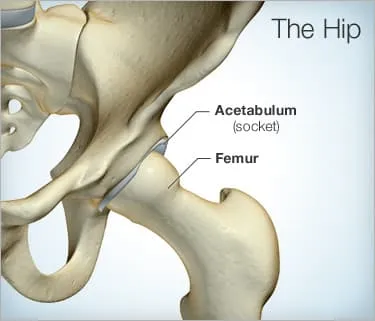About 1.3 million Americans suffer from rheumatoid arthritis (RA). This chronic inflammatory arthritis affects two to three times as many women as men.
Although RA is most commonly associated with joints of the hands and wrists, it can also affect larger joints, such as the hips, knees, and shoulders.
Symptoms of hip arthritis may occur later than those from RA affecting smaller joints.

What Are the Symptoms of Hip RA?
Hip RA can cause symptoms such as severe pain, stiffness, and swelling. With RA hip pain, you may have discomfort and stiffness in the thigh and groin.
Other symptoms of RA include fatigue, loss of appetite, pain, swelling, and stiffness in other joints. RA symptoms can come on gradually or suddenly.
What Causes RA?
RA is an autoimmune disease -- the immune system attacks the patient's own body. Although the cause of RA is not known, experts believe the following may play a role:
- Genetics
- Environmental factors
- Hormones
How Is RA Diagnosed?
To make a diagnosis of RA, your doctor will do a physical exam, take a patient history, and order tests such as blood tests and X-rays.
Other tests that may be helpful in diagnosing RA include:
What's the Treatment for RA?
Treatments for RA include disease-modifying anti-rheumatic drugs (DMARDs). These drugs may be used with non-steroidal anti-inflammatory drugs (NSAIDs) and/or corticosteroids in low doses. DMARDs include:
- hydroxychloroquine (Plaquenil)
- leflunomide (Arava)
- methotrexate (Folex, Rheumatrex)
- sulfasalazine (Azulfidine)
- tofacitinib (Xeljanz)
DMARDs also include drugs known as biologic modifiers; these are usually used with methotrexate. Biologic agents include:
- abatacept (Orencia)
- adalimumab (Humira)
- adalimumab-atto (Amgevita), a biosimilar to Humira
- anakinra (Kineret)
- certolizumab (Cimzia)
- etanercept (Enbrel)
- etanercept-szzs (Erelzi), a biosimilar to Enbrel
- golimumab (Simponi, Simponi Aria)
- infliximab (Remicade)
- infliximab-abda (Renflexis), a biosimilar to Remicade
- infliximab-dyyb (Inflectra), a biosimilar to Remicade
- rituximab (Rituxan)
- sarilumab (Kevzara)
- tocilizumab (Actemra)
NSAIDs may also be used to treat hip RA. NSAIDs may be over-the-counter or prescription strength.
Is Exercise Important for RA?
Regular exercise is important for RA. Exercise strengthens muscles that support joints.
Exercise also helps you stay flexible. This is important to prevent painful falls.
Physical therapy can help you learn ways to move without pain or injury. Occupational therapy is helpful to learn easier ways to perform activities of daily living, such as dressing, cooking, eating, or cleaning.
What About Surgery for Hip RA?
Hip surgery is an option when severe pain or joint destruction causes immobility.
For more severe disease, total joint replacement may be recommended. It's estimated that about 80% of patients will have good results for 12-15 years after hip replacement. Most patients have little pain after this surgery.

